|
|
|
Sort Order |
|
|
|
Items / Page
|
|
|
|
|
|
|
| Srl | Item |
| 1 |
ID:
172123
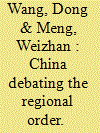

|
|
|
|
|
| Summary/Abstract |
This article examines China’s academic debates on the regional order in Asia since 2012, by surveying nine thematic issues. Those thematic issues are not exhaustive, yet they provide an overview of China’s intellectual landscape on the key issue of the regional order in Asia. This study shows that the United States (US) might have exaggerated China’s strategic intention. Rather than aiming to replace US hegemony with a Chinese-led Tianxia/tributary system in the region, Chinese scholars advocate mutual accommodation between China and the US.
|
|
|
|
|
|
|
|
|
|
|
|
|
|
|
|
| 2 |
ID:
101315
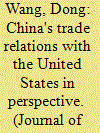

|
|
|
|
|
| Publication |
2010.
|
| Summary/Abstract |
China's trade relations with the United States over the past four decades is a topic that has not been fully dealt with in scholarly works. This paper charts the course of US-China economic relations since 1971, explains the principal forces stimulating growth and encouraging change and, finally, discusses how these two economic giants fit into an interlocking Asian and world economy. In reaction to the post-2008 financial downturn, advocates for a new world economic order have suggested a rebalancing of global demand, which will arguably become a major, politically charged issue in the US and in China in the years to come. Growing economic interdependence has quickly presented new challenges and opportunities, with issues such as human rights, Most-Favoured-Nation status, the Taiwan and Tibet question, and the huge American trade deficit threatening to cloud the relationship at times. With China's emergence as a major power and America's hegemonic ambitions tested in successive wars, the contradiction between a booming commercial relationship and conflict associated with geopolitical and ideological differences will continue to constitute a serious challenge. The long-term goal for each side will be to forge economic ties strong enough to create a stable political relationship, rather than to be held hostage by geopolitical constraints.
|
|
|
|
|
|
|
|
|
|
|
|
|
|
|
|
| 3 |
ID:
177018
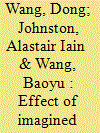

|
|
|
|
|
| Summary/Abstract |
Social identity theory (SIT) suggests that perceived identity difference between groups predicts to intergroup conflict, including interstate conflict. Contact theory suggests that social contact between groups can help reduce intergroup conflict. Contact theory, however, has not traditionally focused on perceived identity difference, and it has not been tested much on real-world interstate conflicts. Employing an experimental design, our study tests for the effects of imagined social contact on Chinese students’ generally malign perceptions of identity difference with Japanese people. We find that imagined contact reduces key perceptions of difference by reducing both perceived Japanese malignity and perceived Chinese benignity. This suggests that social contact helps produce new hybrid in-group. By employing SIT, our findings provide a new microfoundation for contact theory, suggest an important process in the creation of security communities, and provide a proof of concept for public policies aimed at large-scale cultural exchanges.
|
|
|
|
|
|
|
|
|
|
|
|
|
|
|
|
| 4 |
ID:
098331
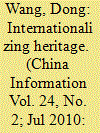

|
|
|
|
|
| Publication |
2010.
|
| Summary/Abstract |
As a new but influential international and local institution, UNESCO's World Heritage List constitutes an important sector of the continued internationalization in China, which has yet to be factored in by scholars researching China's reopening and integration into the global community. The notion of deregulation or "bringing down institutional barriers" in trade, politics, society, and education- disproportionately emphasized in most of the literature-is insufficient to understand important elements of internationalization such as national heritage. The ongoing internationalization of China's key heritage sites originated primarily in international appreciation of their significance- and expeditions to explore them-as well as in the historical rediscovery of their own cultural treasures by Chinese at various periods in the past. Both globalization and internationalization result in a strengthened state on multilevels under certain circumstances. The synergistic process of collaboration, resistance, confrontation, and compromise that produces internationalization, as evidenced by UNESCO's Longmen Grottoes, is not a simple zero-sum situation for the state party, community, ordinary citizens, and international actors involved. In the case of Luoyang, the tensions between universal internationalism, particular nationalism, and diverse localism were reconciled through developments managed by the state and its subordinate governments.
|
|
|
|
|
|
|
|
|
|
|
|
|
|
|
|
| 5 |
ID:
134994


|
|
|
|
|
| Summary/Abstract |
The U.S. strategy of pivot/rebalancing to Asia, unveiled during the first Obama term, has generated and still generating in mainland China heated debate about the nature and implications of the American strategy. How do strategic analysts in mainland China assess the U.S. pivot/rebalancing to Asia and what are the policy prescriptions they provide to the leadership in Beijing? In this paper, we outline the scholarly and policy debates in mainland China regarding the U.S. pivot/rebalancing strategy. In the process of doing so, we will examine the theoretical outlook of the Chinese discourses. We will also show that whereas policy makers in mainland China largely remain sober-minded and stress the importance of cooperative, non-adversarial relations with the United States, the U.S. pivot/rebalancing strategy has nevertheless increased the sentiment of insecurity and sense of being threatened among elites and the public in mainland China. As a result, the U.S. pivot/rebalancing has contributed to the emerging security dilemma between mainland China and the United States
|
|
|
|
|
|
|
|
|
|
|
|
|
|
|
|
| 6 |
ID:
173254


|
|
|
|
|
| Summary/Abstract |
Although China did not announce any official urbanization policy until 2014, since the 1980s urbanization has been the core goal of China’s unceasing push for modernization and national rejuvenation. Tens of millions of inhabitants living on the fringes of China’s cities merely hold temporary permits with virtually no political and social rights and only a modicum of public policy benefit in the cities where they work. The rights and social entitlements of these people are changing once again, because cities in China are now required by the central government to include the majority of them as normal citizens with equal rights. From the perspectives of three groups of peri-urban residents – relocated agricultural elites, in situ urbanites, and migrant workers – in Luoyang, Shanghai, and Hohhot, this article traces the dynamic dimensions of this ongoing, highly complex urbanization process. We argue that the decision to become a participant, negotiator, deal-maker, or deal-breaker in the migration, displacement, and/or resettlement process involves proactive agency and rational choices in a fast-moving environment, and that cities in China must make concessions to convince peri-urbanites to give up their official rural links.
|
|
|
|
|
|
|
|
|
|
|
|
|
|
|
|
| 7 |
ID:
106914


|
|
|
|
|
| Publication |
2011.
|
| Summary/Abstract |
Serving as a de facto introduction to the group of articles in this issue, this essay discusses four varied approaches to state and society, followed by an empirical evaluation of urban China in the realm of heritage governance. Through examining the nomination and preservation of the Longmen Grottoes in Luoyang as required by UNESCO's World Heritage status, I argue that the operation of the local political system was a dynamic, interactive, and resourceful process that drew its legitimacy from multiple sources without systematic bias against any particular social group.
|
|
|
|
|
|
|
|
|
|
|
|
|
|
|
|
| 8 |
ID:
179539
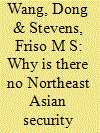

|
|
|
|
|
| Summary/Abstract |
Exploring the ‘organization gap’ that exists in Northeast Asia, this article seeks to explain why there is no such minimal, Deutschian security community and discerns four impediments: played up islands disputes as a symptom of deep resentment shaped by histories of war and animosity; the rise of a fervent form of nationalism related to collective memories and projected at ‘the other;’ the American alliance system and China-US strategic distrust and rivalry; and the nuclear weapons pursuit of North Korea. Contrasting the fatalist logic of the dominant neorealist paradigm, the article goes into the deeper underlying and interconnected obstacles that sustain opposing blocs in Northeast Asia in a spiral of mistrust and arming. Arriving at the ‘Concert,’ or ‘Community’ proposed by White and Kissinger means that the structural, power aspect as well as the domestic socio-historic dynamics particular to Northeast Asia should be examined first. In doing so, the article puts forth conditions under which a process of ‘desecuritisation’ can lead to a viable community in Northeast Asia.
|
|
|
|
|
|
|
|
|
|
|
|
|
|
|
|
|
|
|
|
|